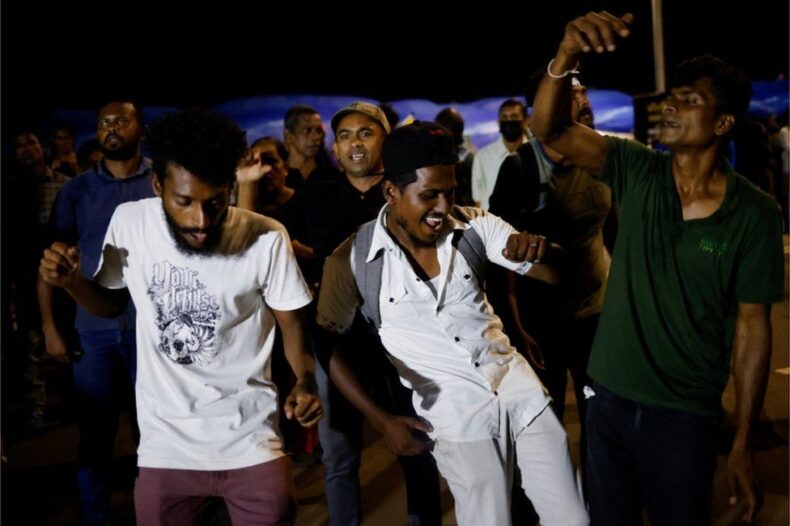According to sources, Gotabaya Rajapaksa, the president of Sri Lanka, has departed from the Maldives for Singapore on a Saudi Arabian Airlines flight.
A day before, amid widespread demonstrations against Sri Lanka’s economic difficulties, the president had fled to the Maldives.
It is unknown if Mr. Rajapaksa would stay in Singapore or if it will be his stopover city.
He had stated that he will step down by Wednesday, but he has yet to formally step down.
It is believed that the leader, who as president enjoys protection from prosecution, wanted to depart Sri Lanka before resigning in order to prevent the risk of being detained by a new administration.
It happens at the same time that on Thursday, interim president Ranil Wickremesinghe ordered a curfew for a second day. For the purpose of putting an end to protests, his government imposed a curfew on Friday from noon (06:30 GMT) until 5:00.
President Rajapaksa named Mr. Wickremesinghe acting president when he took off in a military plane on Tuesday night, but the move sparked further demonstrations calling for the resignation of the prime minister as well.
The protests on Wednesday, which took place at significant sites across the capital, Colombo, including the prime minister’s office, resulted in one fatality and 84 injuries.
Who will allow him to remain?
Tessa Wong, a Colombo-based Asia Digital Reporter, provided analysis
Many people want to know where Gotabaya Rajapaksa intends to go next in his flight. Who will allow him to stay in, maybe, the more crucial query?
It is unknown whether Singapore will serve as a stopover on the way to the Middle East or whether he plans to stay there, and if so, how long.
But according to insiders, it is unlikely that the Singaporean government will permit him to stay for a long time
The wealthy city-state has already hosted divisive individuals like Thein Sein, Robert Mugabe, and Kim Jong-un. However, it’s likely that they will draw a line at harboring Mr. Rajapaksa for the long term.
This individual is wanted for war crimes, is currently the subject of an intensive international inquiry, and has fled while his nation descends into economic catastrophe. Singapore would not be worth the negative attention it would receive from around the world.
Authorities would also have to deal with opposition from Singaporeans, who have recently become increasingly outspoken and forceful.
There is a sizable Tamil population in the nation as well, some of whom are of Sri Lankan descent. As defense secretary during the civil war, Mr. Rajapaksa is accused of permitting the murder of tens of thousands of Tamil civilians.
His presence will anger many Tamil Singaporeans, upsetting the harmony that the authorities have worked so hard to establish.
This individual is wanted for war crimes, is currently the subject of an intensive international inquiry, and has fled while his nation descends into economic catastrophe. Singapore would not be worth the negative attention it would receive from around the world.
Authorities would also have to deal with opposition from Singaporeans, who have recently become increasingly outspoken and forceful.
There is a sizable Tamil population in the nation as well, some of whom are of Sri Lankan descent. As defense secretary during the civil war, Mr. Rajapaksa is accused of permitting the murder of tens of thousands of Tamil civilians.
His presence will anger many Tamil Singaporeans, upsetting the harmony that the authorities have worked so hard to establish.
In sum, the difficulty for authorities increases with Mr. Rajapaksa’s length of stay in Singapore. And that might be a hassle they’d prefer avoiding.
After protestors broke into the presidential palace on Saturday and set fire to the prime minister’s private residence, the country’s economic crisis has been the subject of significant demonstrations since April.
On Wednesday, police opened fire with tear gas at demonstrators who tried to open the gates to the prime minister’s office in Colombo before they succeeded. Later, they tried to enter the parliament but were denied.
According to the constitution, the prime minister should assume the presidency in the event of the president’s resignation; but, Mr. Rajapaksa has yet to do so, raising concerns about the legitimacy of the acting president’s grasp on power.
Basics about Sri Lanka
On an island off the coast of southern India, Sri Lanka attained independence from the British Empire in 1948. 99 percent of the 22 million people living there are from one of three ethnic groups: Sinhalese, Tamil, or Muslim.
For years, one brotherly family has dominated: When his administration overcame Tamil separatist insurgents in 2009, ending a protracted and violent civil war, Mahinda Rajapaksa gained fame among the majority Sinhalese. The current president, Gotabaya, who at the time served as defense secretary, has announced his resignation.
powers of the president While sharing many executive duties with the prime minister, who leads the ruling party, the president of Sri Lanka is the country’s head of state, government, and armed forces.
Now that there is an economic crisis, there is the rage on the streets: there are rolling blackouts, shortages of some groceries, medicines, and fuel as a result of rising inflation, and the Rajapaksa family and their government are being blamed by many.













